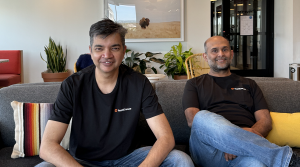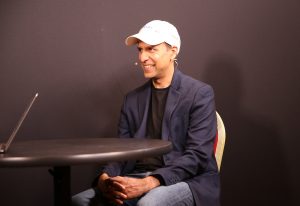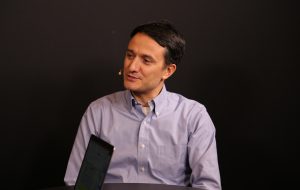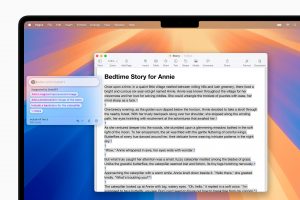Why The Human Factor Makes the Difference in Digital Music: Spotify vs. Google All Access

Image credit: KROQ.com
What music lovers want and what they value can be quite different. Following suit of Pandora’s pioneering platform, many music services including Spotify and All Access have used human expertise to teach computers to identify and play songs in a style that exemplifies the instrumentation, influences and even gender of the artist a user chooses. Certainly users enjoy predictive radio play that allows them to enjoy and discover music based on their taste. However, what may be most important to these consumers is what the computer cannot give – personal endorsements, sharing and expert curation that requires a human touch. Recent trends on Spotify and Google’s All Access strategy explain how both companies capitalize on such human factors in digital music services. While Spotify’s economic director believes this “human factor” is, in part, helping the platform transform the music industry, All Access aims to provide a unique, personal and educational experience for music lovers. Still, it seems both companies may be missing out on ways to make curated content actionable; the company that learns how to do this without compromising the human feel may be the next hit.
From Sex Appeal to “Share Appeal”
 Sex Appeal. Youthfulness. Energy. VentureBeat’s Tom Cheredar notes that these characteristics have often been traits of a popular hit record. But, what actually makes a song an international success can be understood more scientifically in today’s digital music era. At the Media Evolution Conference, Will Page, Spotify Economics Director referenced Lorde’s “Royals” to illustrate how digital music platforms help relatively obscure artists top the charts. Page’s presentation highlights the importance of digital music curation, social sharing and data analytics that chart the evolution of a song’s success.
Sex Appeal. Youthfulness. Energy. VentureBeat’s Tom Cheredar notes that these characteristics have often been traits of a popular hit record. But, what actually makes a song an international success can be understood more scientifically in today’s digital music era. At the Media Evolution Conference, Will Page, Spotify Economics Director referenced Lorde’s “Royals” to illustrate how digital music platforms help relatively obscure artists top the charts. Page’s presentation highlights the importance of digital music curation, social sharing and data analytics that chart the evolution of a song’s success.
Lorde topped Spotify charts in 2 weeks after being added to Sean Parker’s “Hipster International” playlist on April 2, 2013. This occurrence might suggest that simply getting the recognition of someone famous is and has always been important to music popularity. However, Page explained that although the song received significant attention after receiving Parker’s blessing, people consumed more of it through sharing effects. Page says, “The important observation here is that, yes, the song broke through from a playlist, but once that happened, sharing kicked in, and people began discovering it on their own…sharing made it personal.” In other words, the song’s success wasn’t solely attributed to Parker’s addition, but the resulting sharing that it prompted.
While the United States still dominates as the number 1 music exporter, Page argues that Spotify is enabling more cultural diversity in the music industry. He notes, “Spotify has allowed the Swedish music industry to expand year on year…If [the industry] is growing, those labels can invest in more talent, that talent can get more fans and its just a self-reinforcing principle.” Validation of artists becomes both personal and collective on platforms like Spotify, and this trend allows emerging artists in various regions to be recognized.
The Rhythm “Curation Nation”
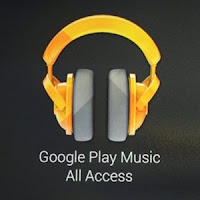 As innovative as music streaming and download services have been in forever changing how we now enjoy and discover music, there has been a fundamental limitation in predictive play radio platforms like Spotify and Pandora. FastCo’s John Paul Titlow suggests the problem is that machine learning can never provide the sophisticated analysis of a plain old human. To illustrate, he posits: “With a band whose catalog is as evolutionary and nuanced as The Beatles’, how can computers truly understand the artist and recommend relevant music to fans? After all, not everybody who loves A Hard Day’s Night necessarily has a soft spot for the weirdest moments on The White Album. For humans, detecting the difference is easy. For machines, it’s not so simple.” Google’s recent platform, All Access combines human knowledge and machine learning differently than Pandora to capture what machines miss.
As innovative as music streaming and download services have been in forever changing how we now enjoy and discover music, there has been a fundamental limitation in predictive play radio platforms like Spotify and Pandora. FastCo’s John Paul Titlow suggests the problem is that machine learning can never provide the sophisticated analysis of a plain old human. To illustrate, he posits: “With a band whose catalog is as evolutionary and nuanced as The Beatles’, how can computers truly understand the artist and recommend relevant music to fans? After all, not everybody who loves A Hard Day’s Night necessarily has a soft spot for the weirdest moments on The White Album. For humans, detecting the difference is easy. For machines, it’s not so simple.” Google’s recent platform, All Access combines human knowledge and machine learning differently than Pandora to capture what machines miss.
Instead of just having human experts teach computers to identify and play songs in a style that exemplifies the instrumentation, influences and even gender of the artist a user chooses, All Access uses human intelligence to provide more complex music knowledge and curation. All Access’ Tim Quirk explains that Google has put a lot of effort in offering comprehensive song collections that not only play the best music in every genre, but educate the music loving masses about how genres evolve. Quirk says: “We have a lot of experts in every genre whose responsibility is to say ‘Okay. If you want to understand the history of the genre and how its sound evolved, these are the 10 to 25 or 50 tracks.”
Last year, SiliconANGLE’s Kristen Nicole predicted that questions of new business models would become more pressing as massive amounts of data fostered the need for expert curators to separate the signal from the noise. While Page discusses the importance of what he calls a “viral co-efficient” that involves “turning buyers into sellers” and “turning consumers into editors,” it seems neither Spotify nor All Access have taken full advantage of new business opportunities for curation. Springpad co-founder, Jeff Janer believes, the “real opportunity” in the curation era goes beyond providing relevant, curated content from trusted individuals and brands, but also leverages underlying data to make content actionable.
For example, he explains: “[Product] and service reviews that include price comparison, local market availability, links to additional reviews and alerts for price drops and special offers will help the user out when they’re ready to buy.” Yes, Spotify will tell you when a musician you like is performing nearby.
But, can’t music platforms do more and better when it comes to capitalizing on their user data?
For Spotify and All Access, this might include letting me know where I can purchase the necklace Lorde wore in the “Royals,” album poster art or learn how to perfect the make-up technique for the heavy cat eye she models. All the data these platforms collect on me as a user would certainly give them insights into my appreciation for graphic design and style aesthetic. But, the task remains in providing these services in a way that feels helpful and inspiring without being too commercial, aggressive and, most importantly, more profit-driven than personal.
The Music in You
Page identifies an interesting difference between book and music services providers. He says, “Your book collection says who you aspire to be, [your] music collection says who you are.” He notes that 9 out of 10 purchased books (in print) don’t get read – they are given away, forgotten about or simply used as coffee table or bookshelf decoration. Music is purchased because it matters to you individually. The personal significance of music is perhaps, why the human touch in platforms like Spotify and All Access have become increasingly important and, even a marker of competitive edge.
While competitors like All Access and Pandora recognize the importance of curation and user interaction in their respective platforms, Spotify’s role in catapulting a relatively unknown artist to record breaking sales all within less than six months suggests this platform aims to stay as popular and current as their featured artists. Still, both services may have some way to go before fully understanding and leveraging the potential in a way that is as human as it is profitable.
A message from John Furrier, co-founder of SiliconANGLE:
Your vote of support is important to us and it helps us keep the content FREE.
One click below supports our mission to provide free, deep, and relevant content.
Join our community on YouTube
Join the community that includes more than 15,000 #CubeAlumni experts, including Amazon.com CEO Andy Jassy, Dell Technologies founder and CEO Michael Dell, Intel CEO Pat Gelsinger, and many more luminaries and experts.
THANK YOU




